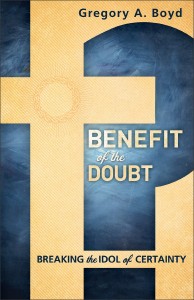Benefit of the Doubt by Greg Boyd
 What is faith? What does it mean to have great faith? What does faith look like in our relationship with God? What is the nature of our relationship with God? These are the questions that drive Greg Boyd’s book Benefit of the Doubt: Breaking the Idol of Certainty. Part theology, part philosophy, part auto-biography, Boyd takes the reader on a journey of exploring the nature of biblical faith, contrasting it with the certainty-seeking faith he sees in many believers today.
What is faith? What does it mean to have great faith? What does faith look like in our relationship with God? What is the nature of our relationship with God? These are the questions that drive Greg Boyd’s book Benefit of the Doubt: Breaking the Idol of Certainty. Part theology, part philosophy, part auto-biography, Boyd takes the reader on a journey of exploring the nature of biblical faith, contrasting it with the certainty-seeking faith he sees in many believers today.
Boyd argues that the problem with faith today is that it is most often expressed as an intellectual, or psychological, certitude. Using the metaphor of the “Strength Tester” carnival game, Boyd writes that the goal for many Christians today is “to hit a faith mallet as hard as you can in order to send the faith puck up the faith pole to get as close to the certainty bell as you possibly can.” (26) Faith has become the removal of, or the resistance to, doubt. The greatness of our faith is directly related to how certain we are about various beliefs; and God, of course, will reward our great faith by answering our prayers and showering us with blessing. Our relationship with God, then, is entirely dependent upon how certain we are in our minds that various things are true.
In chapter 2, Boyd gives eight compelling reasons why this approach to faith is misguided and unbiblical. While each of his objections to certainty-seeking faith give cause for reflection, I found the third objection quite compelling: “It replaces biblical faith with magic.” Some would immediately object to this statement, but I think there is deep truth in this statement. What, after all, is magic? Boyd defines it this way: “Magic is generally understood to involve people engaging in special behaviors that empower them to gain favor with, or to otherwise influence, the spiritual realm in order to get it to work to their advantage.” (38) Certainty-seeking faith aims to make God act on our behalf (through healing, perhaps). It is a means to an end. “One of the many differences between ‘magic’ and biblical faith is that magic is about engaging in behaviors that ultimately benefit the practitioner, while biblical faith is about cultivating a covenantal relationship with God that is built on mutual trust.” (39)
Faith is not just something located in our heads. It is an active and vital thing that can be identified by the way we live our lives. (128)
While some might argue that what Boyd asserts comes very close to works-righteousness, I think he is providing a needed corrective to our modern understanding of faith. Nowhere in the Bible does it say that faith exists only in our heads, or that it is related to our psychological certainty. Biblical faith does not point to a relationally-external contract and demand salvation because of a past confession. Biblical faith is a covenantal marriage based on mutual trust in one another’s character. Our blessed assurance is not based on how little we doubt our how great our certainty is, but on Jesus and what he reveals about God – particularly what he reveals about God at the cross. After all, “the only one from whom we should ever draw conclusions about God’s character is Jesus.” (238)
God is good. Jesus showed us that. Our faith in God is a lived experience, a covenantal relationship based on his character. It is not based on a contractual agreement – an external, legally-binding arrangement – whose benefits are accessed by keeping doubt at bay and achieving various levels of certainty. We have hope, not in the power of our minds to believe the unbelievable, but in the power of God who raised Jesus from the dead.

